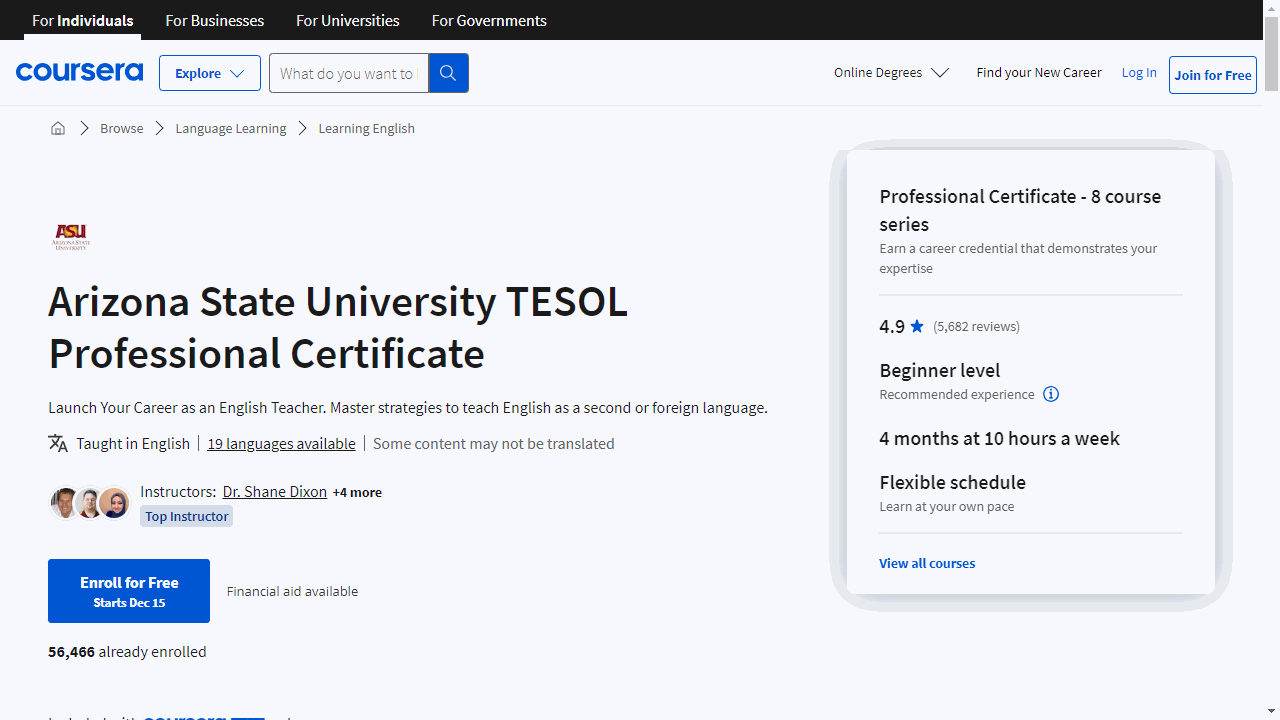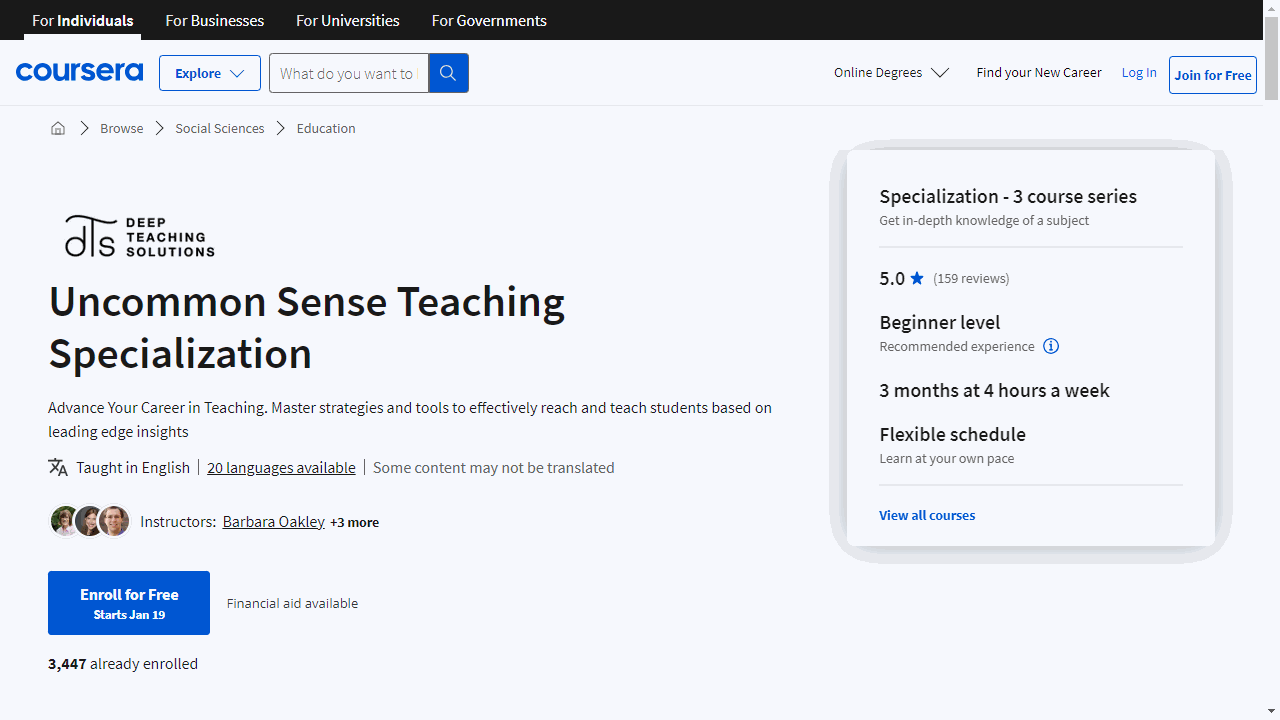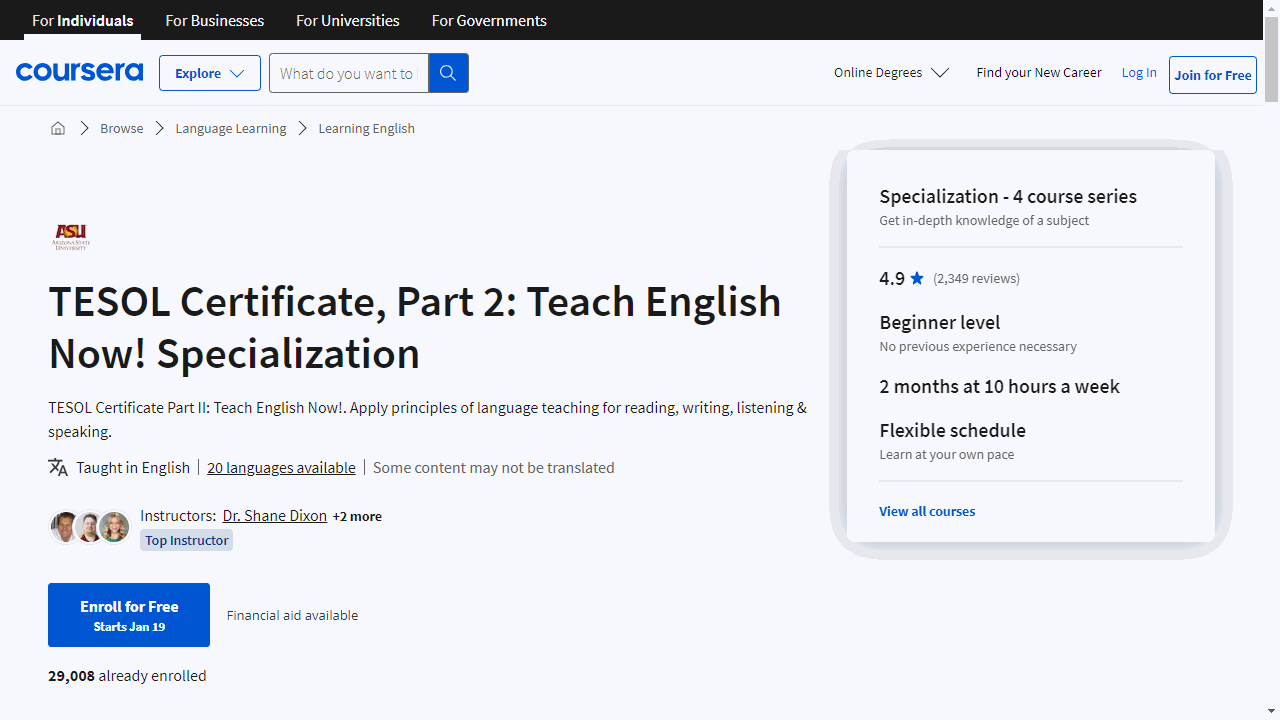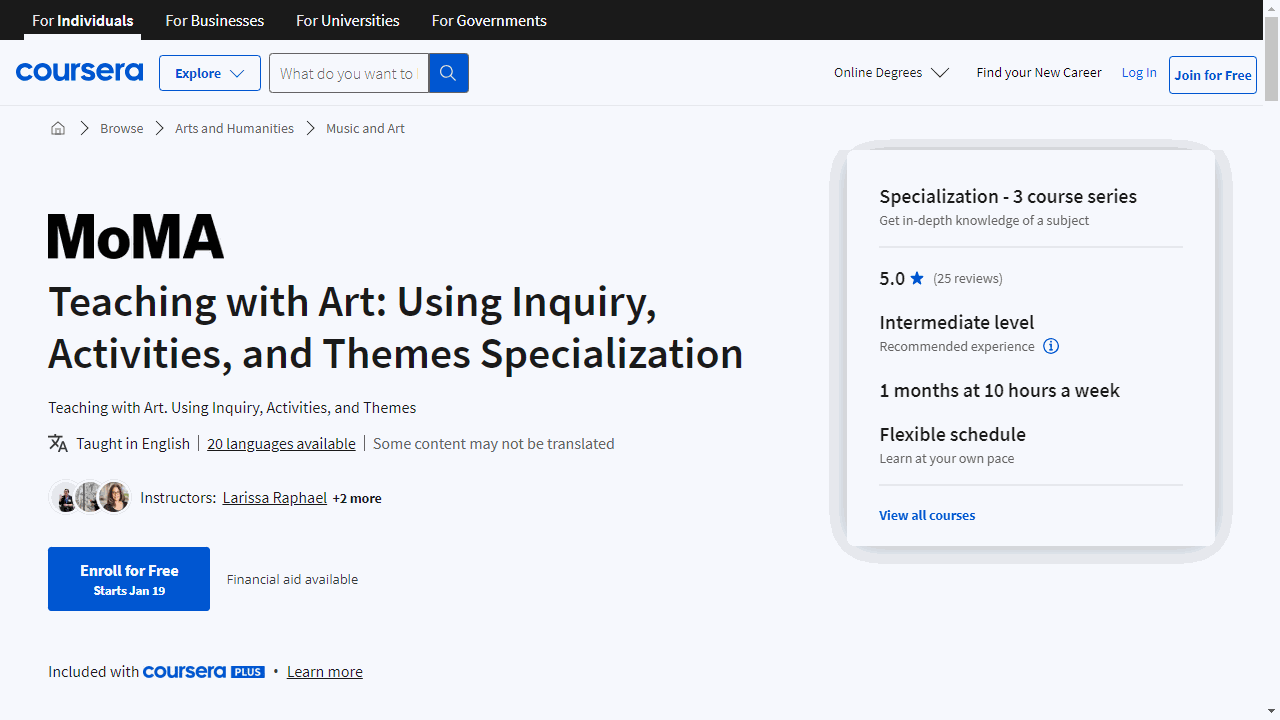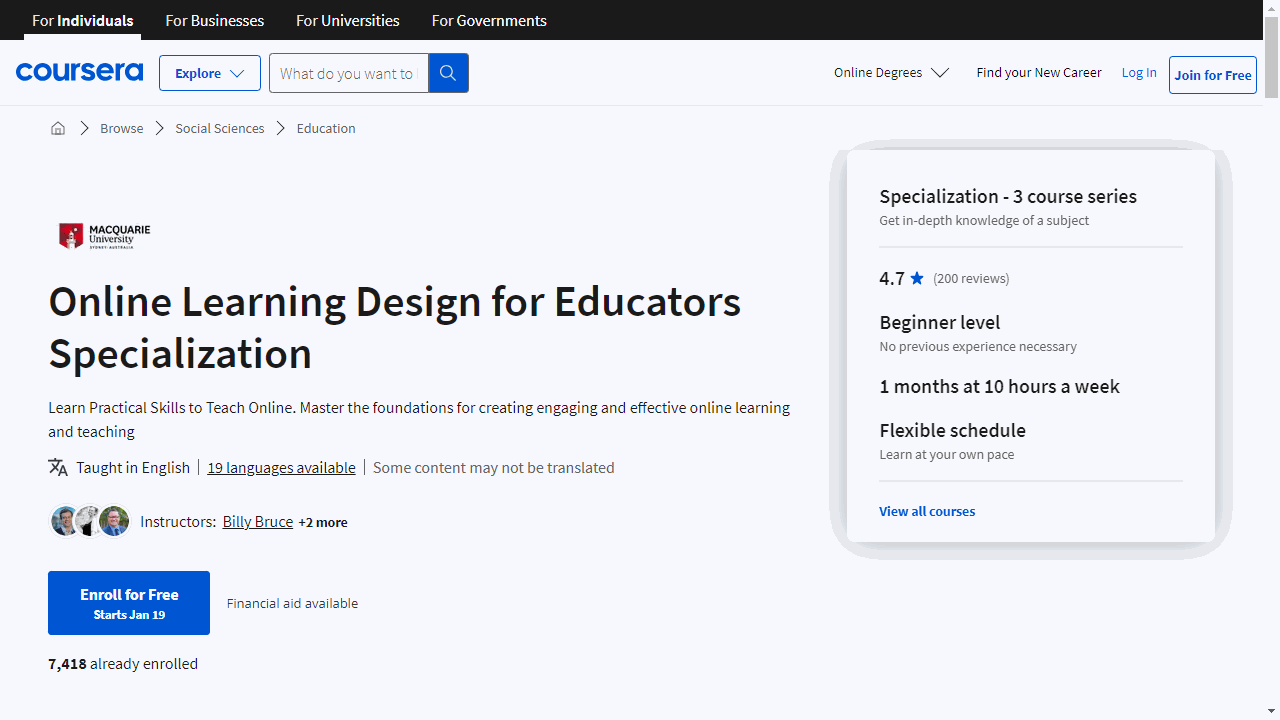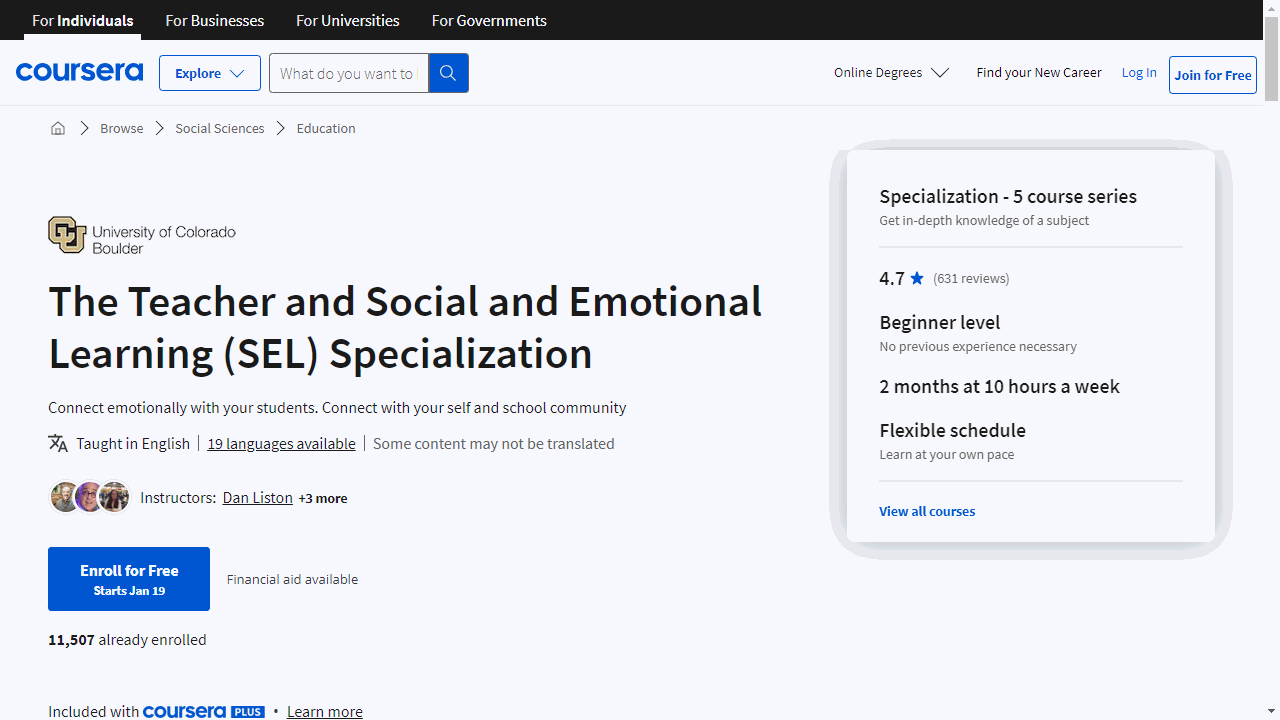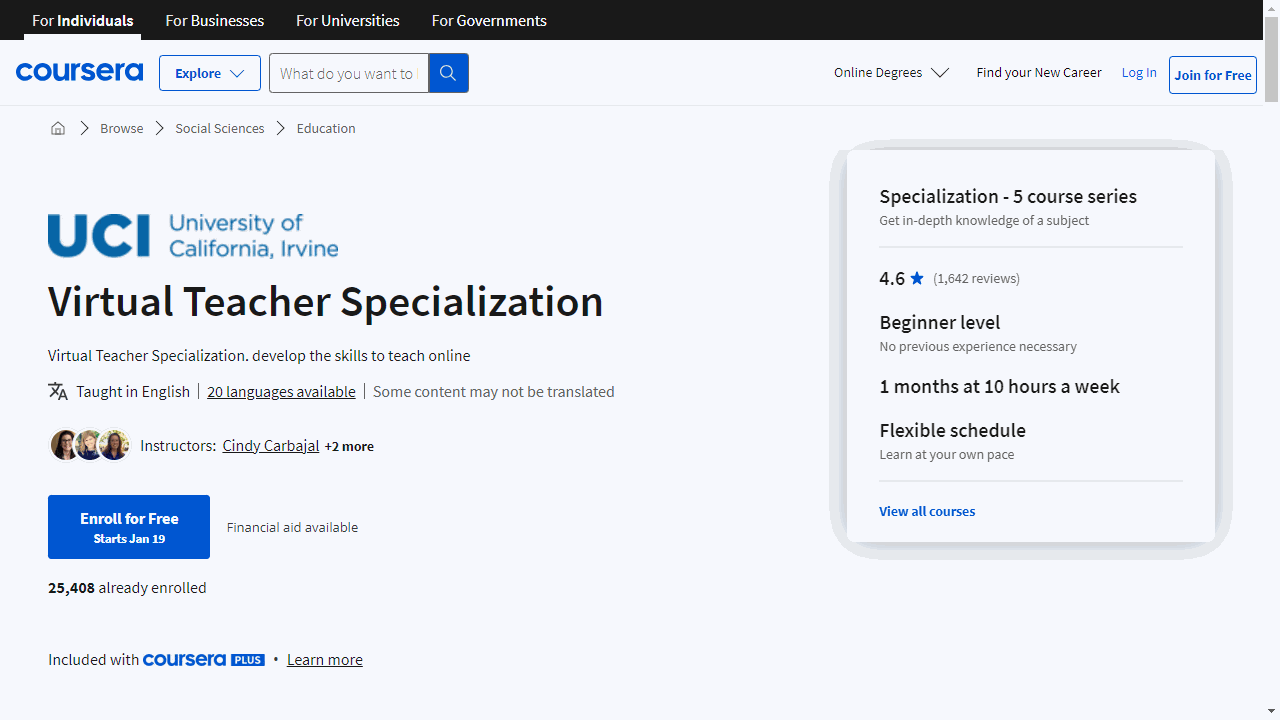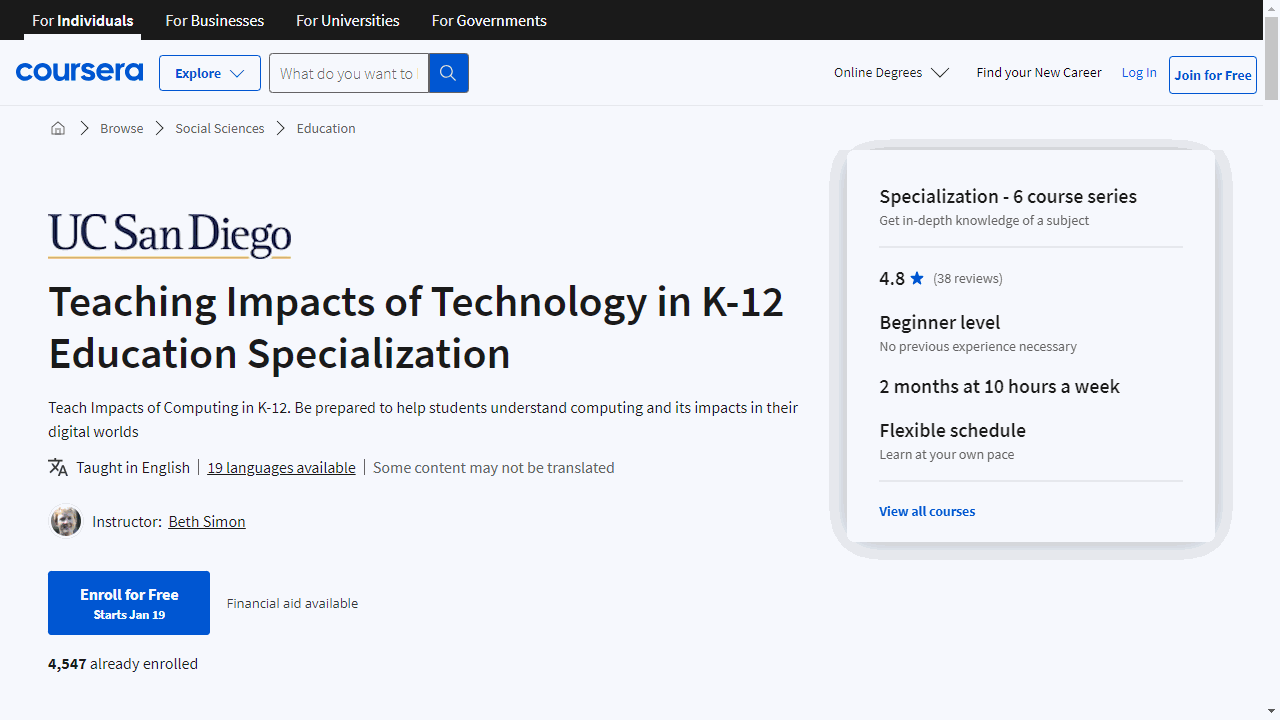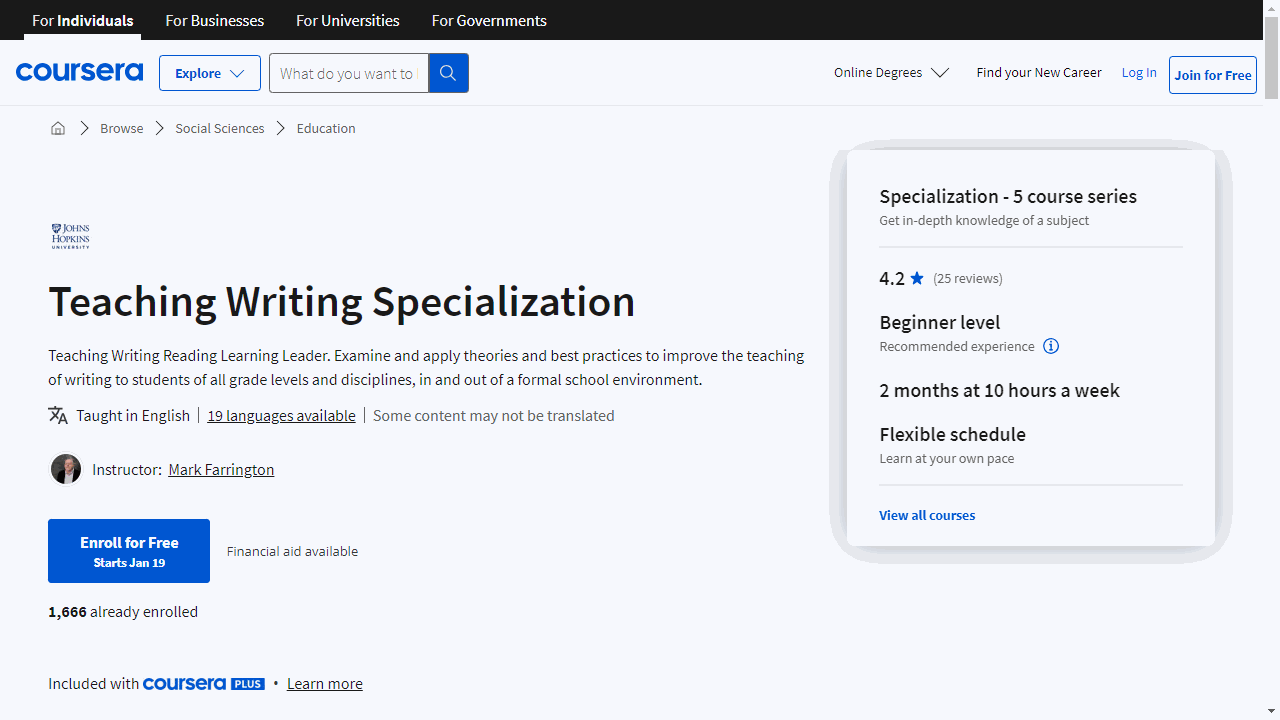Finding the right teaching course can feel like searching for a needle in a haystack, especially with the vast array of options available on platforms like Coursera.
You want a course that aligns with your teaching goals, provides practical skills, and keeps you engaged.
Many factors influence your decision, such as whether you’re a beginner or seasoned teacher, what subject you teach, and if you’re looking for specific pedagogical approaches.
We’ve scoured Coursera’s vast library of courses and have compiled a list of the best teaching courses for educators at all levels.
After careful consideration, we’ve identified Arizona State University TESOL Professional Certificate as the best overall teaching course.
This specialization provides a comprehensive path to mastering English language teaching, with a focus on practical skills, current methodologies, and technological integration.
It starts with foundational principles and progresses to advanced topics like second language acquisition and technology-enriched teaching.
But don’t stop there!
We’ve curated a collection of top-notch options covering various teaching topics, including literacy, technology, and social-emotional learning.
Keep reading for recommendations tailored to different needs and learning styles.
Arizona State University TESOL Professional Certificate
Provider: Arizona State University
This TESOL certificate from ASU offers a comprehensive path to mastering English language teaching, with a focus on practical skills, current methodologies, and technological integration.
Dive into “Teach English Now! Foundational Principles” to grasp the basics of language learning.
You’ll discover how to motivate students, control your classroom, and differentiate between learning and acquisition, all while leveraging technology to enhance your teaching.
Build upon this foundation with “Teach English Now! Theories of Second Language Acquisition,” where you’ll craft your teaching philosophy and delve into effective practices for teaching listening, speaking, and pronunciation.
You’ll also gain insights into grammar translation and audio-lingual methods, anchored in second language acquisition research.
“Teach English Now! Lesson Design and Assessment” teaches you to create engaging lesson plans that balance memory and knowledge learning.
You’ll learn to start classes with warm-up activities that capture students’ attention and make content stick.
The “Teach English Now! Capstone Project 1” offers a hands-on experience, where you’ll observe teachers, analyze lessons, and develop your teaching philosophy.
You’ll also design a lesson plan and share teaching tips, culminating in a peer-reviewed teaching video.
Completing both parts of “Teach English Now!” qualifies you for ASU’s 150-hour TESOL Certificate.
For those focused on literacy, “Teach English Now! Second Language Reading, Writing, and Grammar” provides strategies for teaching reading and writing, integrating grammar in a way that’s natural and engaging.
In “Teach English Now! Second Language Listening, Speaking, and Pronunciation,” you’ll tackle the challenges of teaching oral skills and learn to incorporate pronunciation effectively into your lessons.
“Teach English Now! Technology Enriched Teaching” keeps you at the forefront of educational technology, ensuring you can integrate the latest tools without overshadowing the language learning process.
Finally, “Teach English Now! Capstone Project 2” is where you’ll refine your teaching practice, recording and submitting ten videos to demonstrate your growth and proficiency.
Uncommon Sense Teaching Specialization
Provider: Deep Teaching Solutions
In the foundational course, “Uncommon Sense Teaching,” you’ll discover innovative strategies that blend neuroscience with real-world classroom insights.
This course equips you with the tools to engage a diverse classroom effectively, ensuring that every student, regardless of their learning style or ability, can thrive.
The sequel, “Uncommon Sense Teaching: Part 2, Building Community and Habits of Learning,” delves into the advantages of neurodiversity, including dyslexia and ADHD, and the surprising benefits of forgetting.
You’ll learn to manage your classroom with ease, motivate students appropriately, and sidestep unproductive teaching trends.
Crafting impactful lesson plans is also a key takeaway.
For those interested in online teaching, “Uncommon Sense Teaching: Teaching Online” is a game-changer.
It offers fresh, research-backed approaches to digital education.
You’ll understand how to make online learning interactive and how to apply social learning effectively, even in a virtual setting.
This course is also a resource goldmine for anyone considering teaching via platforms like Udemy or YouTube, with Creative Commons licensed materials for you to use and share.
Each course is a stepping stone to mastering teaching in a way that resonates with today’s learners.
TESOL Certificate, Part 2: Teach English Now! Specialization
Provider: Arizona State University
Dive into teaching reading and writing with confidence, learning to address various reading challenges and mastering both intensive and extensive reading techniques.
Engage your students effectively in the writing process and seamlessly integrate grammar into your lessons.
Move on to “Teach English Now! Second Language Listening, Speaking, and Pronunciation” to tackle the intricacies of oral communication.
Understand and teach concepts like paralinguistics and regional speech variations.
You’ll gain strategies to enhance your students’ listening and speaking abilities, and you’ll learn how to incorporate pronunciation practice into your lessons for more natural English speaking.
If technology excites you, “Teach English Now! Technology Enriched Teaching” is your go-to course.
It’s designed to help you integrate the latest educational technology into your teaching without overshadowing the language learning experience.
Stay ahead of the curve by learning to navigate current tech trends and connect with professional development networks for continuous learning.
Cap it all off with the “Teach English Now! Capstone Project 2,” where you’ll apply everything you’ve learned.
Create and refine lesson plans, then record yourself teaching to demonstrate your new skills.
Complete this final step, along with both parts of the Teach English Now! Specialization, and you could earn your ASU 150-hour TESOL Certificate, in addition to Coursera certificates.
Teaching with Art: Using Inquiry, Activities, and Themes Specialization
Provider: The Museum of Modern Art
Say goodbye to mundane lessons and hello to a world where art and education converge to inspire both you and your students.
This specialization is crafted to seamlessly integrate art into your teaching, making lessons more dynamic and impactful for your students.
Dive into “Art & Inquiry: Museum Teaching Strategies For Your Classroom” to master the art of inquiry-based learning.
You’ll learn to craft questions that provoke thought and encourage students to engage deeply with content.
This approach not only enlivens discussions but also sharpens critical thinking skills, preparing students for complex problem-solving.
Next, “Art & Activity: Interactive Strategies for Engaging with Art” offers you tools to design hands-on activities that transform students from passive listeners to active participants.
This course emphasizes the importance of activity-based learning, fostering personal development and a more profound understanding of the material through direct experience.
Finally, “Art & Ideas: Teaching with Themes” connects artistic themes to a wide array of academic subjects.
By exploring themes like Places & Spaces and Art & Society, you’ll learn to create interdisciplinary connections that resonate with students’ lives and interests.
This thematic approach not only enriches your curriculum but also helps students see the relevance of their learning in the broader world.
Each course in this specialization is a stepping stone to creating a more engaging, thoughtful, and connected classroom environment.
Online Learning Design for Educators Specialization
Provider: Macquarie University
Dive into “Online education: The foundations of online teaching” to grasp the essentials of digital instruction.
You’ll explore how online learning shifts from traditional methods and tailor your teaching to meet online learners’ needs.
Discover easy-to-use tools that make your virtual classroom engaging.
If you’re keen on making lessons more dynamic, “Create video, audio and infographics for online learning” is your go-to.
Learn to craft videos, podcasts, and infographics that cater to diverse learning styles.
This course empowers you to create memorable content that resonates with all learners.
For those using live video, “Online teaching: Using Zoom to connect with learners” is indispensable.
Master Zoom’s features, from managing breakout rooms to engaging with polls, and confidently run your virtual classroom.
You’ll even craft a Zoom lesson plan, applying what you’ve learned directly to your teaching.
With skills in pedagogy, instructional design, and multimedia, you’ll be equipped to create compelling online courses.
The Teacher and Social and Emotional Learning (SEL) Specialization
Provider: University of Colorado Boulder
This five-course series equips you with the skills to integrate SEL into your teaching, benefiting both you and your students.
Dive into “The Teacher’s Social and Emotional Learning” to understand the emotional landscape of teaching.
You’ll examine your own experiences with emotions like joy and sadness and how they influence your educational beliefs and practices.
“SEL for Students: A Path to Social Emotional Well-Being” guides you through the evolution of SEL in schools.
You’ll learn to articulate the concept of social emotional well-being, assess SEL programs, and tailor these to fit your classroom’s needs.
With “Expanding SEL,” you’ll explore how SEL extends beyond the classroom, addressing broader social issues.
This course is essential if you’re interested in how SEL can tackle challenges like structural racism and support community-based learning.
“Teacher SEL: Programs, Possibilities, and Contexts” presents established SEL programs for educators.
You’ll delve into mindfulness and narrative techniques to better understand and manage your responses to teaching challenges.
Cap it all off with the “SEL Capstone,” where you’ll apply your knowledge to create impactful SEL strategies for your school.
Choose between developing a comprehensive plan or examining the role of cinema in SEL.
This specialization is designed to meet the University of Colorado’s rigorous academic standards, with a rich blend of reading materials complementing the video lectures.
Complete the series and you’re eligible to apply for 3 graduate credits, advancing your professional credentials.
If you’re eager to enhance your teaching with SEL’s transformative power, this specialization is tailored for you.
Virtual Teacher Specialization
Provider: University of California, Irvine
This specialization equips you with the expertise to thrive in the digital classroom, focusing on K-12 education but applicable to all teaching levels.
Start with “Foundations of Virtual Instruction” to master the essentials of online teaching.
You’ll learn to tailor virtual lessons to your students’ needs, foster a community in your digital classroom, and use online tools for personalized feedback.
This course also offers strategies for engaging at-risk students and making your virtual presence more relatable.
Move on to “Emerging Trends & Technologies in the Virtual K-12 Classroom” to stay ahead with the latest educational technology.
Whether you’re teaching high schoolers or adapting content for younger learners, this course helps you integrate tech seamlessly into your lessons, enhancing student engagement through collaborative tools and game-based learning.
With “Advanced Instructional Strategies in the Virtual Classroom,” you’ll discover how to inspire critical thinking and motivation in your students.
It’s about creating connections and fostering an inclusive online learning environment that supports every student, including those at risk.
In “Performance Assessment in the Virtual Classroom,” you’ll tackle the challenges of evaluating student performance remotely.
Learn to navigate online assessments with integrity, manage grades effectively, and use data to inform your teaching practices, ensuring all students meet their learning goals.
Finally, the “Virtual Teacher Final Project” is your opportunity to apply what you’ve learned by designing an online learning module.
You’ll draft a plan that incorporates effective online instruction theories and strategies, crafting a learning experience that resonates with your students.
Throughout these courses, you’ll engage with key concepts like MOOCs, academic integrity, and authentic performance.
You’ll also explore the role of communication and collaborative learning in virtual education.
Teaching Impacts of Technology in K-12 Education Specialization
Provider: University of California San Diego
This specialization equips you with the skills to teach the digital world’s complexities in a way that’s engaging and accessible to young learners.
Dive into “Teaching Impacts of Technology: Fundamentals” to understand how everyday tech like GPS and streaming services fit into our lives and how to explain these concepts to students using constructivist activities.
You’ll explore real-world applications of technology, such as food delivery apps and entertainment platforms, and learn pedagogical techniques to bring these topics alive in the classroom.
In “Teaching Impacts of Technology: Data Collection, Use, and Privacy,” you’ll tackle the critical issues of data privacy and cybersecurity.
Get hands-on with cookies, encryption, and the intricacies of the Internet, preparing you to teach students about their digital footprint and how to protect it.
“Teaching Impacts of Technology: Relationships” reveals how technology shapes our social connections.
You’ll examine the algorithms behind social media and the role of geolocation in our interactions, all while learning to apply the ICAP framework for active learning outcomes.
Prepare for the future with “Teaching Impacts of Technology: Workplace of the Future.”
This course covers the impact of the Internet on careers, cloud computing, and the skills needed for tomorrow’s jobs.
You’ll also learn to review and critique curricular materials, focusing on web development essentials like HTML.
“Teaching Impacts of Technology: Global Society” broadens your perspective to global technology trends, discussing topics like Internet censorship, the Internet of Things, and cybersecurity measures like two-factor authentication.
You’ll also prepare students for success on the computer science advanced placement exam.
Cap it all off with the “Capstone Project: Teaching Impacts of Technology,” where you’ll apply what you’ve learned by analyzing a computing innovation and its global impact, mirroring the Advanced Placement Computer Science Principles course.
Throughout the specialization, you’ll align with CSTA K-12 computer science standards, fostering an inclusive computing culture and honing your ability to communicate complex tech concepts clearly.
Teaching Writing Specialization
Provider: Johns Hopkins University
This comprehensive program demystifies the writing process, equipping you with actionable strategies to nurture confident writers.
Dive into “Teaching Writing Process” to understand how writing unfolds in stages.
You’ll learn to teach writing as a journey of discovery, incorporating low-stakes writing and reflection to bolster student confidence.
For those challenging moments with students who shy away from writing, “Teaching Reluctant Writers” offers a lifeline.
You’ll uncover the root causes of their hesitation and gain a suite of techniques, from mentoring to scaffolding, to transform reluctance into engagement.
Broaden your teaching repertoire with “Teaching Texts and Forms,” where you’ll master the art of teaching various writing forms, including personal essays and creative writing.
This course also shows you how to seamlessly integrate reading into your writing instruction, enhancing students’ understanding of texts.
Feedback and revision are crucial, and “Responding, Revising and Assessing Student Writings” provides a deep dive into effective practices.
Learn to give constructive feedback, guide students through meaningful revisions, and assess their writing in a way that reflects their true progress.
Cap off your learning experience with the “Teaching Writing Final Project.”
Here, you’ll synthesize your new knowledge, selecting key takeaways from each course to craft a personalized plan for your teaching or writing practice.
